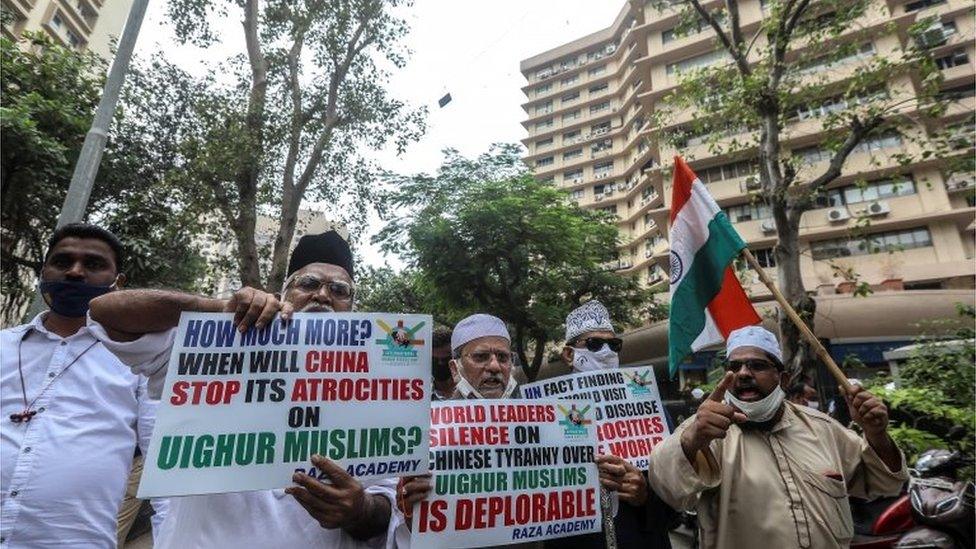Government narrowly sees off Tory revolt over anti-genocide trade deal law
- Published

Protests against China's alleged abuse of the Muslim Uighur community
The government has narrowly seen off a rebellion by 33 Tory MPs, who want to outlaw trade deals with countries judged to be committing genocide.
MPs voted by 319 to 308 to remove an amendment to the Trade Bill which would have forced ministers to withdraw from deals with nations the UK High Court ruled guilty of mass killings.
It comes amid condemnation of China's treatment of the Uighur people.
The rebels believe they have enough support to secure another vote soon.
Among those to defy the government were ex-Tory leader Iain Duncan Smith, former cabinet ministers David Davis and Damian Green and Tom Tugendhat, chair of the Foreign Affairs Select Committee.
International courts
The rebellion is one of the largest on an issue not related to the Covid-19 pandemic during Boris Johnson's time as prime minister.
The government has a Commons majority of 80 but this was whittled down to just 11 as prominent ex-ministers such as Tobias Ellwood, Caroline Nokes and Nusrat Ghani, as well as a number of MPs first elected last year, sided with the opposition.
MPs have been debating proposals, tabled by cross-bench peer Lord Alton, to give British courts the right to decide if a country is committing genocide, a decision currently left to the jurisdiction of international courts.
The proposals, also backed by Labour, would mean that ministers would have to revoke post-Brexit trade deals with countries that were ruled to be carrying out systematic mass killings.
The issue is expected to resurface when the Trade Bill returns to the House of Lords.
Earlier on Tuesday, Conservative rebels, led by former leader Iain Duncan Smith, were unable to force a vote on a separate amendment they had proposed.


Every speaker in today's debate - from the front and back benches - said genocide was abhorrent. The worst of crimes. There was united criticism of China's brutal treatment of the Uighurs too.
But the question Parliament has been wrestling with is whether the High Court should have the right to decide if a country is committing genocide. And if they did judge a country has been carrying out mass killings, should the High Court be able to compel the government to revoke any trade treaty it has with that country?
Ministers insist it should be the job of elected governments, not judges, to determine trade policy. But opposition parties and a large cohort of Tory backbenchers argue it's essential the High Court can rule on genocide and ensure the UK's new trade-making freedom has an obligation to uphold human rights too.
This also is an argument about where power lies after Brexit and what role Parliament should have in shaping trade policy after decades in the EU.

But BBC Newsnight political editor Nick Watt said that by securing large, but not overwhelming, support for Lord Alton's amendment in the Commons, the rebels hope the government will accept Mr Duncan Smith's own amendment - which would give the Commons the right to debate whether trade deals can be halted if genocide is proven.
The debate came as the US government formally declared that China was committing genocide in its repression of Uighur muslims in Xinjiang.
'Light of hope'
The UK government has been critical of China's treatment of the Uighurs and last week announced measures to cut UK business links with forced labour camps in the region.
But some MPs suspect the government is pulling its punches to avoid antagonising Beijing.
Mr Duncan Smith said the debate was "all about simply shining a light of hope to all those out there who have failed to get their day in court and failed to be treated properly".
"If this country doesn't stand up for that then I want to know what would it ever stand up for again?," he added.
But Trade Minister Greg Hands said it was unprecedented and unacceptable to give the courts powers to revoke trade deals agreed by elected governments.
And he argued that no one would benefit from the proposal because the UK currently had no free trade deal with China.